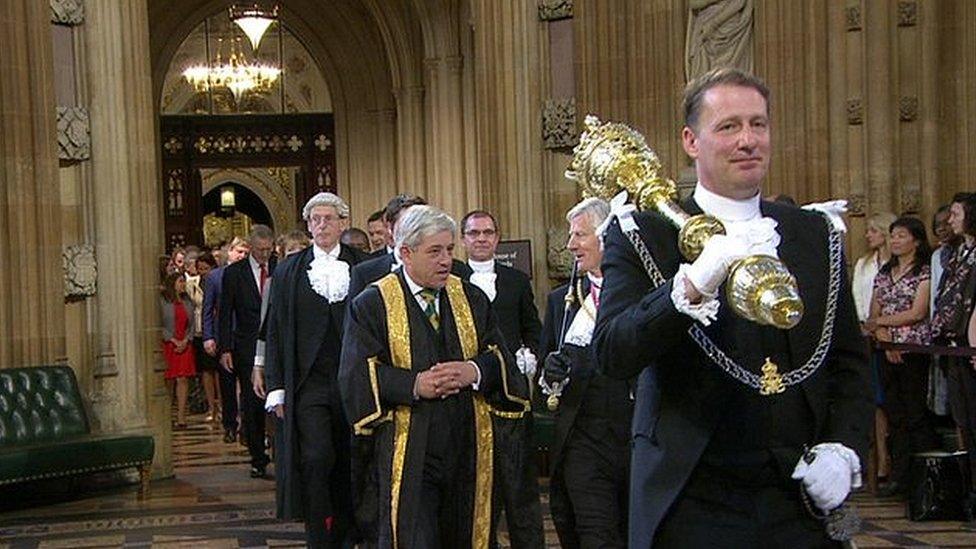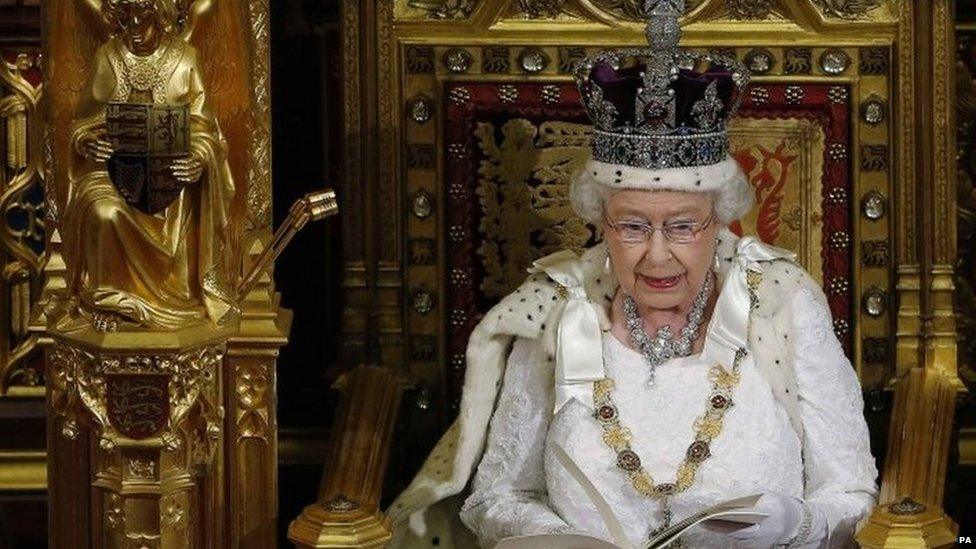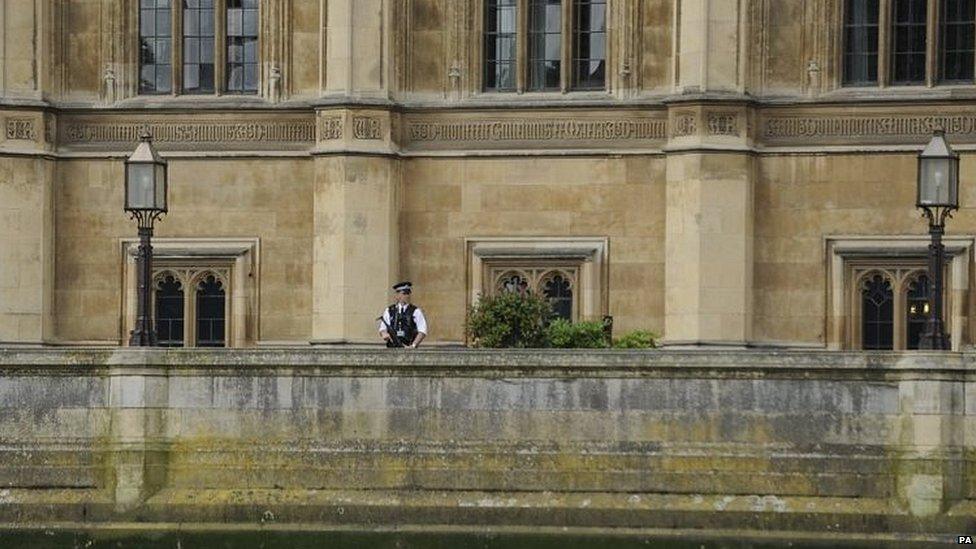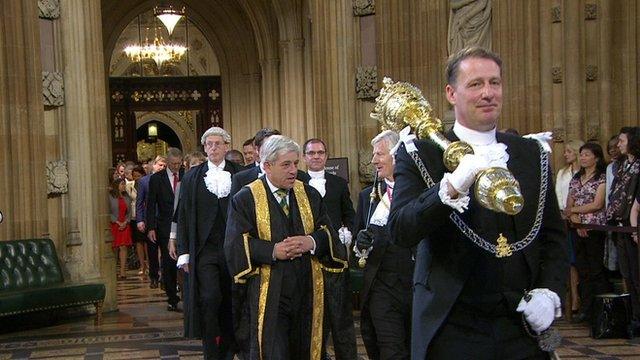From postman to Serjeant at Arms
- Published

Parliament is in search of a new Serjeant at Arms. It is a unique role which dates back to 1415, when Henry V appointed one of his royal Serjeants to keep order in Parliament.
Applicants for the job need to be able to maintain security in and around the House of Commons, welcome high-profile visitors and take part in ceremonial duties, all while wearing an elaborate costume, including frilly lace cuffs, knee breeches, silk stockings and black patent shoes.
The most recent post holder was Lawrence Ward, the 40th Serjeant and the youngest, who left the post in September to take up a security job in the private sector. In an interview for BBC Radio 4's The Westminster Hour, he's been looking back on his four years in the job.

What does the Serjeant at Arms do?
The Serjeant at Arms is responsible for security and keeping order within the House of Commons. The role also involves allowing people in, including MPs and the 1.25 million people who visit every year.
Mr Ward says security measures have increased in the House of Commons over the years but that's "a way of life".
"People understand the reasons," he says. "It's to ensure Parliament continues to operate. These things weigh very heavily on our shoulders."
The Serjeant is the only official in Parliament who is allowed to carry weapons. He or she carries the mace during the Speaker's procession and is also equipped with a gilt, fine-blade sword.
"You really need to be an all-rounder. The job tested every facet of my abilities. It's no secret that I'm particularly hopeless at time-keeping and detail.
"In terms of detail I'm useless and you can't get away with not being able to be somewhere on time because the Speaker's procession won't happen unless you're there. So my life was punctuated by Big Ben chiming and people saying you've got to be here, there or anywhere."

Snobbery in the House
Most of Mr Ward's predecessors in the Serjeant's role were from a military background but he is a former postman who worked his way up through the ranks.
"I did feel some responsibility being probably the first Serjeant to come from a very ordinary, one of the lowest socio-economic, backgrounds. I felt that I was always being judged, although that was probably in my mind. But I didn't want to let my class down."
"I didn't want anyone turning round and saying, 'well it's no surprise that things went horribly wrong, because he was a postman' or 'where did we get him from?'"

A man in tights
Reflections of a Serjeant at Arms
The Serjeant at Arms is often described as one of the "men in tights" because of the elaborate uniform.
"I didn't like the uniform when I first got the job but it was part and parcel. I went to see the Clerk when I was first appointed and said 'do I have to?' and he said 'oh yes'".
"But over the years in the job I grew to respect it in a kind of odd way because people respected me because of wearing the uniform. It's very obvious when you're walking around in that gear that you're a figure of some authority.
"The downside is there's absolutely nowhere to hide because you're always representing Parliament."

The arms
The Serjeant at Arms' duties involve carrying the mace during the Speaker's procession and placing it on the Despatch Box in the Chamber of the House of Commons.
"If you think about the mace and the sword they're both battle weapons. You represent the authority of the House of Commons and because you're the only armed person in the House - armed with the sword or with a mace - it's that visible demonstration of authority."

John McDonnell incident
Mr Ward was in the Commons chamber during a dramatic incident in 2009 involving the Labour MP John McDonnell, now the shadow chancellor.
Mr McDonnell grabbed the mace from the Despatch Box and threw it onto one of the green benches where MPs sit, in protest at the government's decision at the time to back a new runway at Heathrow airport.
"It still sends shivers down my spine," Mr Ward recalls. "I had not been an assistant serjeant for all that long so when John went forward and picked up the mace I thought 'he's got my mace, what I am going to do'. And I thought 'no, wait for the Speaker or Deputy Speaker, wait for his instruction'.
"I could see the doorkeeper looking at me and saying 'he's got the mace, what are you going to do about it?'"
Mr McDonnell was escorted out of the chamber after being "named" by the Deputy Speaker but Mr Ward's worries did not end there.
"There was the challenge when the House resumed of the mace, which was still sat on the bench.
"I went to the bar of the House, I bowed, I went forward to where the mace was, I bowed again, turned round and put the mace on my shoulder, bowed again, went to the table, bowed again, put the mace down, bowed again, shot back, bowed again, tried to make it look as official as possible then said to one of the doorkeepers 'go and get the serjeant'."

State Opening of Parliament

It is the big day of the Parliamentary calendar, when the Queen comes to open a new session in front of assembled MPs, peers and dignitaries.
But Mr Ward felt a "sense of relief" when this and other big ceremonial events were over.
"Anything can happen. If it happens, it is world news. It is not just chip wrappings, it is big stuff."

Security

The Palace of Westminster now has a dedicated security director, a former MI5 agent, but should Parliament cede responsibility for its internal security to the police or another specialist outside body?
Mr Ward says reports that he was concerned about this were "overblown".
"All these things are a team effort. The security director, the Metropolitan Police, Black Rod and everyone else has got a stake in these things. What is worth remembering is where members turn to when things go wrong.
"If there is an incident in the chamber, the Speaker will stand up and hand control to the Serjeant at Arms.
"I have always been a great supporter of the idea we have a structure for Parliamentary security that crosses both Houses. Having said that, there has always been a simple principle I have held onto. That is that the Serjeant is the person with the mace and the sword that keeps everyone at bay.
"That does not mean we don't rely on all of the agencies but when push comes to shove let's look at our history.
"Let's look at the time when Charles I marched in with troops to arrest members. That may all seem like fairytale stuff but that overriding principle of the House of Commons being elected and being responsible for its own matters and procedures is a very good and relevant principle that applies today as it did in Charles I's time."
Listen back to The Westminster Hour's full interview with Lawrence Ward.
- Published21 July 2015

- Published27 February 2012